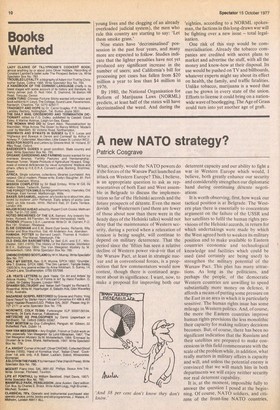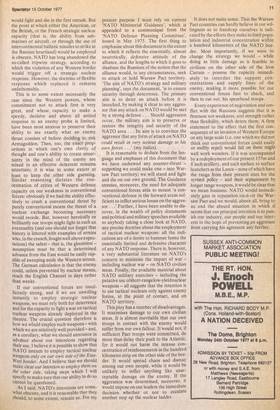A new NATO strategy?
Patrick Cosgrave
What, exactly, would the NATO powers do if the forces of the Warsaw Pact launched an attack on Western Europe? This, I believe, is an appropriate question to ask as representatives of both East and West assemble in Belgrade to discuss the implementation so far of the Helsinki accords and the future prospects of détente. Even the most dovish of Westerners (and there are fewer of those about now than there were in the heady days of the Helsinki talks) would not deny that the maintenance of Western security, during a period when a relaxation of tension is being sought, will continue to depend on military deterrence. That the period since the 'fifties has seen a relative decline of Western power vis-à-vis that of the Warsaw Pact, at least in strategic nuc'ear and in conventional forces, is a proposition that few commentators would now contest, though there is continued argument about its significance. I want, now, to make a proposal for improving both our deterrent capacity and our ability to fight a war in Western Europe which would, I believe, both greatly enhance our security and considerably strengthen our diplomatic hand during continuing detente negotiations.
It is worth observing, first, how weak our tactical position is at Belgrade. The Western plan there is essentially to concentrate argument on the failure of the USSR and her satellites to fulfil the human rights provisions of the Helsinki accords, in return for which undertakings were made by which the West agreed both to weaken its military position and to make available to Eastern countries economic and technological knowledge and facilities which could be used (and certainly are being used) to strengthen the military potential of the Warsaw Pact. This plan has many attractions. As long as the politicians, and perhaps the people, of the democratic Western countries are unwilling to spend substantially more money on defence, it affords a means of putting some pressure on the East in an area in which it is particularly sensitive. The human rights issue has some mileage in Western politics. And, of course, the more the Eastern countries improve human rights provisions the less monolithic their capacity for making military decisions becomes. But, of course, there has been no significant indication that the Russians and their satellites are prepared to make concessions in this field commensurate with the scale of the problem while, in addition, what really matters in military affairs is capacity and will, and unless the potential enemy is convinced that we will match him in both departments we will enjoy neither security nor real deterrent capability. It is, at the moment, impossible fully to answer the question I posed at the beginning. Of course, NATO soldiers, and citizens of the front-line NATO countries, would fight and die in the first onrush. But the point at which either the American, or the British, or the French strategic nuclear capacity (that is, the ability from submarines or aircraft, or through the use of intercontinental ballistic missiles to strike at the Russian heartland) would be employed is obscure. NATO has long abandoned the so-called tripwire strategy, according to which the violation of any Western border would trigger off a strategic nuclear response. However, the doctrine of flexible response which replaced it remains unfathomable.
This is to some extent necessarily the case since the Western powers, whose commitment not to attack first is very great, and whose capacity to make a speedy, decisive and above all united response to an enemy probe is limited, have been most anxious to preserve their ability to see exactly what an enemy thrust consists of before deciding to risk Armageddon. Then, too, the exact proportions in which one's own clarity of thought and one's ability to create uncertainty in the mind of the enemy are mixed in an effective deterrent remains uncertain; it is wise to some extent at least to keep the other side guessing. Similar reasoning dictates the concentration of critics of Western defence capacity on our weakness in conventional forces: obviously if we had the ability effectively to crush a conventional thrust by purely conventional means the threat of a nuclear exchange becoming necessary would recede. But, however heroically or brilliantly our troops might fight in such an eventuality (and one should not forget that history is littered with examples of armies who, in the crunch, fought well above expectations) the safest — that is, the gloomiest — assumption must be that a determined advance from the East would be easily capable of sweeping aside the Western screen. The German calculation is that the enemy could, unless prevented by nuclear means, reach the English Channel in days rather than weeks.
If our conventional forces are insufficently strong, and if we are unwilling instantly to employ strategic nuclear weapons, we must rely both for deterrence and for the capacity to fight a war on tactical nuclear weapons already deployed in the theatre. The crucial question therefore is how we wbuld employ such weapons — with Which we are relatively well provided and, as a corollary, what we should announce in advatce about our intentions regarding their use. I believe it is possible to show that NATO intends to employ tactical nuclear weapons only on our own side of the EastWest border. And I believe that we should make clear our intention to employ them on the other side, taking steps which I will Specify to make sure that our ability to do so cannot be questioned.
As I said, NATO's intentions are somewhat obscure, and it is reasonable that they Should, to some extent, remain so. For my present purpose I must rely on current 'NATO Ministerial Guidance', which is appended to a communiqué from the 'NATO Defence Planning Committee', issued in May 1975. The first thing to emphasise about this document is the extent to which it reflects the essentially, almost neurotically, defensive attitude of the alliance, and the lengths to which it goes to disabuse the Russians of the notion that the alliance would, in any circumstances, seek to attack or hold Warsaw Pact territory. 'The aim of NATO's strategy and military planning', says the document, 'is to ensure security through deterrence. The primary aim is to deter an attack before it is launched, by making it clear to any aggressor that any attack on NATO would be met by a strong defence , . Should aggression occur, the military aim is to preserve or restore the integrity and security of the NATO area . . . Its aim is to convince the aggressor that any form of attack on NATO could result in very serious damage to his own forces . (my italics).
It is reasonable to deduce from the language and emphases of this document that we have eschewed any counter-thrust — supposing we could make one — into Warsaw Pact territory; we will stand and fight and die on our own ground. The Guidance stresses, moreover, the need for adequate conventional forces able to mount 'a conventional defence in the forward areas sufficient to inflict serious losses on the aggressor. .' Further, I have been unable to discover, in the wealth of policy documents and political and military speeches available to anybody taking a close look at NATO, any precise doctrine about the employment of tactical nuclear weapons: all the indications are of a desire to hammer home the essentially limited and defensive character of any NATO response. There is, however, a very substantial literature on NATO's concern to minimise the impact of war — including nuclear war — on NATO civilian areas. Finally, the available material about NATO military exercises — including the putative use ofshort-range low-yield nuclear weapons — all suggests that the intention is to use tactical nuclears only against enemy forces, at the point of contact, and on NATO territory.
This ploy has a number of disadvantages. It maximises damage to our own civilian areas. It is almost inevitable that our own troops in contact with the enemy would stiffer from our own fallout. It would not, if sufficient Pact troops were committed, do more than delay their push to the Atlantic, for it would not harm the intense concentration of reinforcements in the hundred kilometre strip on the other side of the border. It would spread chaos and dismay among our own people, while it would be unlikely to inflict anything like unacceptable damage on the enemy. If the aggression was determined, moreover, it would impose on our leaders the immediate decision whether or not to escalate another step up the nuclear ladder. It does not make sense. That the Warsaw Pact countries can hardly believe in our willingness so to handicap ourselves is indicated by the efforts they make to limit population and industrial concentration within a hundred kilometres of the NATO border. Most importantly, if we were to change the strategy we would — while doing as little damage as is feasible to civilians on the other side of the Iron Curtain — possess the capacity immediately ' to interdict the support concentrations and supply lines of the enemy, making it more possible for our conventional forces first to check, and then to cut out, his spearhead troops.
Every experience of negotiation and conflict with the Russians suggests that it is firmness not weakness, and strength rather than flexibility, which deters them. A firm statement to the effect that the first con-, sequence of an invasion of Western Europe* on any large scale (i.e. one which we did not think our conventional forces could easily or swiftly repel) would fall on them might well work wonders. If it was accompanied by a redeployment of our present 155m and 8 inch artillery, and such surface to surface launchers as the Lance — none of which have the range from their present sites for the revised policy — and their replacement by longer range weapons, it would be clear that we mean business. NATO would immediately gain in reputation vis-a-vis the Warsaw Pact and we would, above all, bring to an end the absurd situation in which it seems that our principal intention is to punish our industry, our people and our interests in the hope of preventing on aggressor from carrying ,his agression any further.



































 Previous page
Previous page